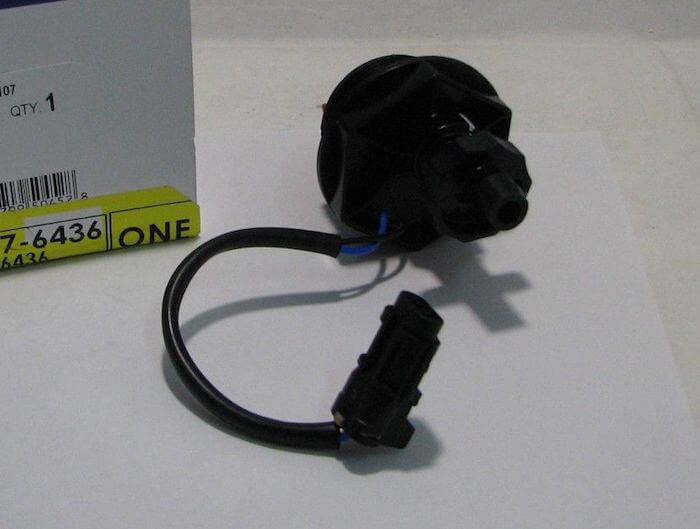P2265 Water in fuel sensor circuit out of range / performance
Content
- P2265 Water in fuel sensor circuit out of range / performance
- OBD-II DTC Datasheet
- What does this mean?
- What is the severity of this DTC?
- What are some of the symptoms of the code?
- What are some of the common causes for the code?
- What are some steps to troubleshoot the P2265?
- What are the standard ways to fix this code?
- Related DTC discussions
- Need more help with the P2265 code?
P2265 Water in fuel sensor circuit out of range / performance
OBD-II DTC Datasheet
Water in fuel sensor circuit out of range / performance
What does this mean?
This is a generic Diagnostic Trouble Code (DTC) applicable to many OBD-II vehicles (1996 and newer). This may include, but is not limited to, vehicles from Land Rover (Range Rover), Ford, Hyundai, Jeep, Mahindra, Vauxhall, Dodge, Ram, Mercedes, etc. Despite the general nature, the exact repair steps may vary depending on from year, make, model and transmission configuration.
OBD-II DTC P2265 is associated with water in the fuel sensor circuit, also known as the fuel composition circuit. When the power control module (PCM) detects an out-of-range or other performance problem with electrical signals in the water-in-fuel sensor circuit, P2265 will set and the engine light will turn on. The water in fuel indicator may also come on if the vehicle has this warning indicator. Consult vehicle specific resources to find the sensor location for your specific model year / make / configuration.
A water-in-fuel sensor is designed to monitor the fuel that passes through it to ensure that ethanol, water, and other contaminants do not exceed a certain percentage. In addition, the fuel temperature is measured by a water-in-fuel sensor and converted to a voltage pulse width monitored by the PCM. The PCM uses these readings to adjust the valve timing for optimum performance and fuel economy.
Typical water-in-fuel sensor: 
What is the severity of this DTC?
The severity of this code can vary greatly from a simple check engine light or water in a fuel lamp on a car that starts and moves to a car that stalls, misfires, or won't start at all. Failure to correct this situation in a timely manner can result in damage to the fuel system and internal engine components.
What are some of the symptoms of the code?
Symptoms of a P2265 trouble code may include:
- Engine may stall
- Severe misfiring
- The engine will not start
- Poor fuel economy
- Low productivity
- Check engine light is on
- The water-in-fuel indicator is on
What are some of the common causes for the code?
Reasons for this P2265 code may include:
- Faulty water in the fuel gauge
- Contaminated fuel
- Blown fuse or jumper wire (if applicable)
- Defective or worn out fuel filter
- Corroded or damaged connector
- Faulty or damaged wiring
- Defective ECU
What are some steps to troubleshoot the P2265?
The first step in troubleshooting any problem is to review the vehicle-specific Technical Service Bulletins (TSBs) by year, model, and powerplant. In some cases, this can save you a lot of time in the long run by pointing you in the right direction.
The second step is to check the vehicle records to find out when the fuel filter was changed and visually check the condition of the filter. The most common causes of this code are a faulty fuel filter or contaminated fuel. Visual inspection of the fuel can be carried out using a glass container. After a sample is taken and allowed to settle, the water and fuel will separate within a few minutes. The presence of water in the fuel is a sign of contaminated fuel, a bad fuel filter, or both. You should then locate all components in the water in the fuel circuit and perform a thorough visual inspection to check the associated wiring for obvious defects such as scratches, abrasions, exposed wires, or burn marks. Next, you should check the connectors for security, corrosion and damage to the contacts. On most vehicles, the sensor is usually mounted on top of the fuel tank.
Advanced steps
The additional steps become very specific to the vehicle and require the appropriate advanced equipment to be accurately performed. These procedures require a digital multimeter and vehicle specific technical reference documents. The ideal tool to use in this situation is an oscilloscope, if available. The O-scope will provide an accurate illustration of signal pulses and frequency levels that will be proportional to the level of fuel contamination. Typical frequency range is 50 to 150 hertz; 50 Hz corresponds to clean fuel, and 150 Hz corresponds to a high level of pollution. The requirements for voltage and signal pulses depend on the year of manufacture and model of the car.
Voltage test
The water-in-fuel sensor is typically supplied with a reference voltage of approximately 5 volts from the PCM. If this process detects that a power source or ground is missing, a continuity test may be required to verify the integrity of wiring, connectors, and other components. Continuity tests should always be done with power disconnected from the circuit and normal readings for wiring and connections should be 0 ohms of resistance. Resistance or no continuity indicates faulty wiring that is open or shorted and requires repair or replacement.
What are the standard ways to fix this code?
- Replacing the water in the fuel sensor
- Replacing a blown fuse or fuse (if applicable)
- Cleaning connectors from corrosion
- Repair or replace faulty wiring
- Removing contaminated fuel
- Replacing the fuel filter
- ECU firmware or replacement
Common mistakes can include:
The problem is caused by replacing the PCM or water-in-fuel sensor when the wiring is damaged or the fuel is contaminated.
Hopefully the information in this article has helped point you in the right direction for solving your water in the fuel circuit DTC problem. This article is for informational purposes only and specific technical data and service bulletins for your vehicle should always take priority.
Related DTC discussions
- There are currently no related topics in our forums. Post a new topic on the forum now.
Need more help with the P2265 code?
If you still need help with DTC P2265, post a question in the comments below this article.
NOTE. This information is provided for informational purposes only. It is not intended to be used as a repair recommendation and we are not responsible for any action you take on any vehicle. All information on this site is protected by copyright.

